By Paul Rozycki
After a decade and a half of giving Flint area listeners hours of civil and wide-ranging conversations in politics, music, science, writing, and the arts, Tom Sumner has decided to end his radio program. It has run on WFOV 92.1 FM in Flint.
In his recent post, Sumner said “I’m suspending production of The Tom Sumner Program indefinitely effective Friday September 2, 2022. There are several reasons, but if I were to pick three, they would be dwindling audience, increasing difficulty raising money, and for 15 years I have been trying to set an example of how information should be explored, respected and shared in a civilized way – and yet – public conversation throughout the country is becoming meaner and less informed.”

Local radio personality Tom Sumner at the microphone. (Photo by Paul Rozycki)
Democrats, Republicans, and “off the beaten path”
Over the last 15 years, Sumner has interviewed a score of presidential candidates, most Michigan candidates for governor, the U.S. Senate, the U.S. House, many local candidates for the state Senate and House, and almost every Flint mayoral candidate. He has also interviewed nearly every candidate for the Flint City Council or County Commission. He has held forums for many candidates, including one “off the beaten path to the White House,” where minor parties, who rarely have a forum, had the chance to air their views.
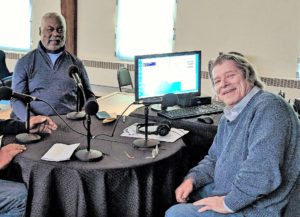
Tom Sumner interviewing former Flint Mayor and local and state politician, the late Woodrow Stanley. (Photo by Paul Rozycki)
Expert insights
The program has introduced listeners to a variety of experts in many areas. Richard Walker, formerly of the Longway Planetarium, offered his insights on astronomy and geology, UM-Flint economist Chris Douglas gave regular updates on the status of the economy, and legal expert Brendan Beery explained the latest Supreme Court decisions and their implications for the average citizen.
Musical artists
Sumner has hosted musical artists who played everything from Bach to Grand Funk. Sumner fondly recalls the conversations he’s had with Flint Symphony Orchestra Conductor Enrique Diemecke on the fine points of Mahler or Bach. But he also recounts the times he’s hosted Flint’s Mark Farner of Grand Funk Railroad and Eddie Money on the show. Even after recalling the famous names in music that he interviewed, he takes greatest pride in the “local musical talent in the Flint area” who often performed on the show.
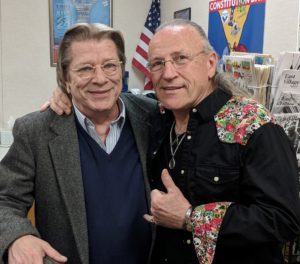
Sumner with Grand Funk Railroad’s Mark Farner (Photo by Paul Rozycki)
Writers and authors
He has hosted interviews with authors of mystery novels, cookbooks, travel guides, history books, political books, photography books, and art books. Best-selling authors David Baldacci, Mary Higgins Clark, and Debbie Macomber, have all been regular guests on the show. He recalls one story when President Obama met Baldacci at a book signing, when Obama smiled and said “You’re a celebrity,” to the writer. One of his interviews involved writers who were given the chance to complete the writing of the Mark Twain children’s book.
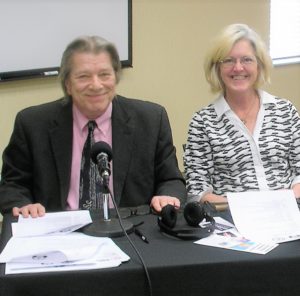
Sumner with long-time co-host and assistant Andrea Sutton (Photo by Paul Rozycki)
Entertainers, actors, and witches
He said one of his most memorable interviews was with Carl Reiner who spoke of his days working with Sid Caesar and how his interest in acting was sparked by the WPA arts programs developed by FDR in the 1930s. A last-minute connection gave him a chance to interview actor Tony Shalhoub, of Monk fame, when he was in the area.
He has also interviewed the sons or daughters of a number of celebrities including Vincent Price, Rod Sterling, and Charles Schultz.
On Friday the 13th or Halloween he would often have a Wiccan priestess take calls and do Tarot card readings on the air.
“He’s been everywhere, man!”
He has even taken the show to Hell, (MI) every Halloween, and has done the show on a train to Lansing. He’s done the show on the road from St. Ignace, Cadillac, Mt. Pleasant, and the Birch Run Speedway as part of the Back to the Bricks Promo Tour.
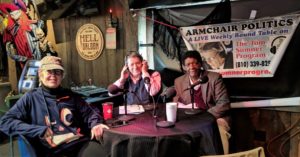
The Tom Sumner show broadcast from Hell Saloon in Hell, Michigan. Seated with Sumner are Jan Worth-Nelson (left) and Henry Hatter (right). (Photo by Paul Rozycki)
He has done shows from the White Horse Tavern, Kettering University, Baker College, Mott Community College, Good Beans Café, WFNT 1470, a studio in the Flint School Bus depot, the Burton City Hall, a basement on Flint’s east side, the Lansing Lugnuts ballpark, a new supermarket on the north end of Flint, The Bavarian Inn, and Slo’ Bones Bar, in Frankenmuth, Calvelli’s in Lapeer, Bluebell Beach, the Flint Flat Lot during Back to the Bricks, Flint’s New McCree Theater, and in the last two years his home studio in the Davison area.

Armchair Politics panel at Hell Saloon in Hell, Michigan. From left to right: Paul Rozycki, Tom Sumner, Jan Worth-Nelson and Henry Hatter. (Photo submitted by Paul Rozycki)
And while Sumner gives great credit the critical role played by those who helped as co-hosts and technology experts over the years, he did a great deal on his own, broadcasting five shows a week, for three hours a day, 52 weeks a year, with much preparation for each show, delivering the quality one would expect from a major broadcast outlet.
Civil discourse and an informed democracy
But the significance of the Tom Sumner Program isn’t the number of places he’s been, or the number of people he’s interviewed over the years, as large as those numbers might be. It is the nature of those interviews that matters. In his political interviews he has had Democrats, Republicans, Socialists, Libertarians, and Green Party candidates on the program and has treated them all with respect and dignity.
Unlike many interviews where candidates are allotted two minutes to present their ideas, the Sumner Program typically gave candidates 45 minutes to an hour to speak to the voters and respond to Tom’s questions. The questions he asked were a serious attempt to learn more about the candidates and their views. He didn’t fall back on “softball” questions, or try to embarrass a candidate with “gotcha” questions.
In a time when so much political discourse is a 30 second commercial, a tweet, or a snarky one-line Facebook post, Sumner’s interviews were an example of what informed democracy is all about. He said his goal was to “get to know the people behind the news, and get people to listen more.” Nearly every interview ended with information on how to learn more about the candidate on their website or other source.
More importantly, his interviews and discussions were an example of what a civil discussion is all about. He often contrasted his program to what he called “rant radio” where the loudest and noisiest voices got the most attention.
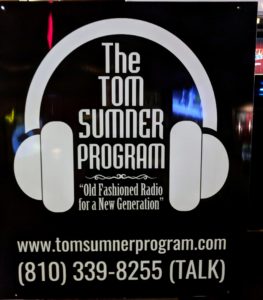
Unfortunately in the last few decades it has been the “rant radio” of Rush Limbaugh, Alex Jones, and their imitators who have defined much of our politics. There are many causes for the divisions we see in our politics today, but much of the tone has been set by those kind of programs. Social media made it even easier for anyone to join the rant.
With Sumner’s civil discussion, even among those who come from different parties and hold opposing opinions, one could find common ground. His program was a sharp contrast to much of the divisive rhetoric that we see in much of the media today.
Armchair Politics
My own involvement with the Sumner Program came over a decade ago with his weekly “Armchair Politics” segment, where every Wednesday morning, Henry Hatter and I, along with a rotating third chair, would discuss the politics of the week. Though Henry and I came from differing viewpoints and party loyalties, the discussion was always informative and civil. One of the greatest rewards I have from the Sumner Program is the friendship with Henry and the chance to meet the many guest chairs who have been part of Armchair Politics.
One of the regular third chairs on Armchair Politics is East Village Magazine Consulting Editor Jan Worth-Nelson. Her views on the Sumner Program and Armchair Politics speak for all who have been part of the program for the last decade or more.
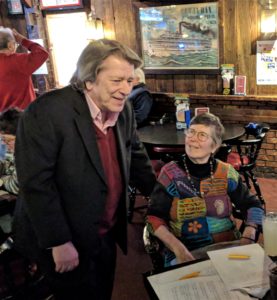
Tom Sumner with Jan Worth-Nelson at a fundraiser at White Horse Tavern in Flint. (Photo by Paul Rozycki)
She said “He was one of the best propagators of good citizenship I know. In this time of fakery, mediocre thinking and massive bullshit, Sumner always maintained his grace, immense curiosity, and humor. He tolerated emotional outbursts but always brought things back to respectful consideration. He is world-weary but still loves the old values of fair play and — yes, democracy. I learned so much from him and his guests. It was so much fun — and an honor — to be on the show with him, Paul Rozycki and Henry Hatter. I love his voice, literally and figuratively, and I can’t bring myself to refer to this in the past tense: I’m sad it’s ending.”
Part of Flint’s history
Not only has the show been a forum for civil discussion in these divisive times, but it’s also been a valuable historical record of much of the politics of Flint and the surrounding area. With the changing nature of the local print media much of that history could be lost. Thankfully, Tom has recorded his program and it has been available at www.tomsumnerprogram.com and as part of that history he is making arrangements to donate the recordings of the program to the University of Michigan-Flint Genesee County History Archives in the near future.
A thank you to all
In the end Sumner offered a gracious thank you to all who have been part of the program.
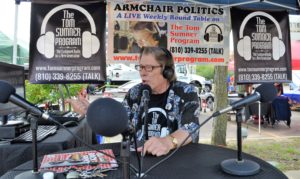
Tom Sumner, signing off…(Photo by Paul Rozycki)
He said, “Any disappointment and/or burn-out I might be feeling can’t diminish the pride I have in the caliber of guests the show has attracted. Political candidates, best-selling authors, live music and a variety of studios and locations have earned the show a reputation I never could have imagined when I began 15 years ago. The list of people for whom I am incredibly grateful includes guests, listeners, and contributors of money and other resources. To all of YOU, I say THANK YOU!”
EVM political columnist Paul Rozycki can be reached at paul.rozycki@mcc.edu.


You must be logged in to post a comment.